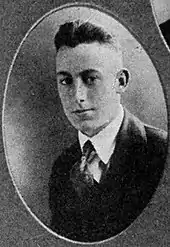Milman Parry
Milman Parry (June 23, 1902 – December 3, 1935) was an American scholar of epic poetry and the founder of the discipline of oral tradition.
Milman Parry | |
|---|---|
| Born | June 23, 1902 |
| Died | December 3, 1935 (aged 33) Los Angeles, California, United States |
| Nationality | American |
| Spouse(s) | Marian Thanhouser (Parry) |
| Academic background | |
| Education | Oakland Technical High School |
| Alma mater | University of California, Berkeley University of Paris |
| Academic work | |
| Discipline | Classical studies Linguistics |
| Sub-discipline | Epic poetry Homeric scholarship Oral-formulaic composition |
| Institutions | Harvard University |
| Influenced | Albert Lord |
Early life and education

Parry was born in 1902, graduated from Oakland Technical High School in 1919,[1] and studied at the University of California, Berkeley (B.A. and M.A.) and at the Sorbonne (Ph.D.). A student of the linguist Antoine Meillet at the Sorbonne, Parry revolutionized Homeric studies. In his dissertations, which were published in French in 1928, he demonstrated that the Homeric style is characterized by the extensive use of fixed expressions, or 'formulas', adapted for expressing a given idea under the same metrical conditions. Meillet introduced him to Matija Murko, who had worked on oral epic traditions in Yugoslavia[2] and had made phonograph recordings of some performances.
Academic career
Between 1933 and 1935 Parry, at the time Assistant Professor at Harvard University, made two trips to Yugoslavia, where he studied and recorded oral traditional poetry in Serbo-Croat with the help of his assistant Albert Lord and Nikola Vujnović. They worked in Bosnia, where literacy was lowest and the oral tradition was, in the term used by Parry and Lord, "purest". The two are now famous for their work in orality/literacy, which has come to be known as the Parry/Lord theory.
In his American publications of the 1930s Parry introduced the hypothesis (first suggested to him by Meillet and amply demonstrated in his own fieldwork) that the formulaic structure of Homeric epic is to be explained as a characteristic feature of oral composition (the so-called Oral Formulaic Hypothesis). It was continued by Albert Lord, most notably in The Singer of Tales (1960).[3]
Death and commemoration
During his field excursions in the Balkans, Parry developed the habit of carrying a gun. On December 3, 1935, during a visit to California, Parry was unpacking his luggage when the gun went off and killed him. Soon after, rumors developed that Parry had killed himself intentionally; a frequent element of these rumors was a claim that he was despondent over Harvard's failure to give him a permanent appointment. However, detailed examination of the evidence by classicist Steve Reece agrees with the contemporary official conclusion that Parry's death was accidental.[4]
Parry's collected papers were published posthumously: The Making of Homeric Verse: The Collected Papers of Milman Parry, edited by Adam Parry, his son (Oxford University Press, 1971). The Milman Parry collection of records and transcriptions of South Slavic heroic poetry is now in the Widener Library of Harvard University. The journal Oral Tradition is devoted to advancing Parry's work.
Influence
According to Steve Reece, there exists "an enormous body of literature on Parry’s intellectual legacy".[5] His influence is evident in the work of later scholars who have argued that there is a fundamental break in the institutional structure between Homeric Greece and Platonic Greece, a break characterized by the transition from an oral culture to a written culture. This line of thought holds that oral poetry, in Homeric society, served as a sort of log of institutional and cultural practices. In a written culture, written logs take the place of oral poetry. This thesis is associated with Eric Havelock, who cites Parry. Havelock argues that the fixed expressions Parry identifies can be understood as mnemonic aids used to help the poet remember the poetry, which was indeed vital to the well-being of the society, given the importance of the information carried by the poetry.
Explanatory notes
Notes
- "Milman Parry, Class of 1919". School Historical Archive. Retrieved 1 March 2016.
- Stephen Mitchell; Gregory Nagy (2000). "Introduction to the Second Edition pp. vi-xxix". The Singer of Tales (Second ed.). Harvard University Center for Hellenic Studies. Retrieved 26 December 2018.
- Lord, Albert B. (2000). Mitchell, Stephen; Nagy, Gregory (eds.). The Singer of Tales (Second ed.). Harvard University Center for Hellenic Studies. Retrieved 26 December 2018.
- Steve Reece, "The Myth of Milman Parry: Ajax or Elpenor," Oral Tradition 33 (2019) 115-142. The Myth of Milman Parry: Ajax or Elpenor
- Reece, Steve (2019). "The Myth of Milman Parry: Ajax or Elpenor?". Oral Tradition. 33 (1): 115–142.
External links
- Milman Parry at the Database of Classical Scholars
- The Milman Parry Collection of Oral Literature at Harvard University
- The On-Line Database of Harvard's Milman Parry Collection of Oral Literature (MPCOL)